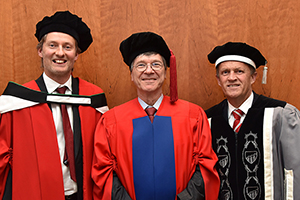Latest News Archive
Please select Category, Year, and then Month to display items
09 December 2020
|
Story UFS entral academic advising team
|
Photo Pixabay

It wasn’t easy, but we all got to this point because we stayed calm and made the effort to learn on even when it was difficult.
The University of the Free State (UFS) has remained committed to supporting you in every way possible, and as you prepare for the final assessments, remember to access the support tools you will need in order to successfully complete the 2020 academic year: https://www.ufs.ac.za/toolsforsuccess
Main exams are running from 30 November to 19 December 2020
All of the best, and break a pen in your upcoming final assessments. For those of you who will be graduating, we cannot wait to see you in that graduation attire; and those who still have some way to go, we cannot wait to serve you again in 2021 as we continue the pursuit of academic success!
Below are five main study tips that you can use for final assessment success:
1. Set a realistic study schedule
You might think that studying for eight hours straight for four days before the exam, will help you get through the work in time. See final edition of the #UFSLearnOn for more information.
2. Structure and organise your work
If your notes are organised, it is also easier for your brain to recall information, even when you become nervous during exams.
3. Practise with an old exam/semester test paper
Practice makes perfect, and although the final assessments might look different in how they are administered, it will still help to practise using old tests and exams.
4. Adapt your strategies to the content
What works for one module or even one learning outcome, might not be effective for another. You need to continually adapt your note-taking and study approaches. See #UFSLearnOn final edition for different study methods.
5. Healthy body, healthy mind
Your brain needs optimal care to perform at its best, and getting physically active (even if it is by jumping in one spot if space is limited) forces your body to release neurotransmitters responsible for positive emotions, which assist in retaining information in your memory …
Download the final edition of #UFSLearnOn that points you towards the resources you’ll need to ace your final assessments and end 2020 off on a high note!
Prof Jeffrey Sachs presented with honorary doctorate at Spring Graduation Ceremony
2015-10-01

Prof Jeffrey Sachs (centre) with Prof Philippe Burger,
Head of Department: Economics (left), and
Prof HJ Kroukamp, Dean of the Faculty of Economic and
Management Sciences (right).
Photo: Charl Devenish |
“Quality education is the best accelerator for sustainable growth. Universities have a unique role to play in this regard,” Prof Jeffrey Sachs said during a lecture he presented at the University of the Free State (UFS) Faculty of Economic and Management Sciences. He gave an insightful overview of the new Sustainable Development Goals (SDGs) of the United Nations. The 17 SDGs replace the Millennium Development goals of the past 15 years. In a major achievement, 193 countries will sign the goals at the United Nations (UN) in New York on 25 September 2015.
Prof Sachs is the director of The Earth Institute, Quetelet professor of Sustainable Development, and professor of Health Policy and Management at Columbia University. He is also a special advisor to the UN Secretary-General Ban Ki-moon on the Millennium Development Goals, and director of the UN Sustainable Development Solutions Network. Another accolade now added to his résumé is an honorary doctorate in Economics conferred on him by the UFS at the Spring Graduation Ceremony on 17 September 2015 for outstanding achievements and contribution to academia.
“South Africa is not achieving sustainable development. It has the highest inequality in the world with high unemployment among the youth. Quality education is the best accelerator for growth,” Prof Sachs said. He used the high education investment in Korea as an example of that country’s growth. Prof Sachs added that the government cannot achieve the SDGs on its own. “It is important for the country and universities to take on the goals. Universities can apply pressure, influence and provide solutions.”